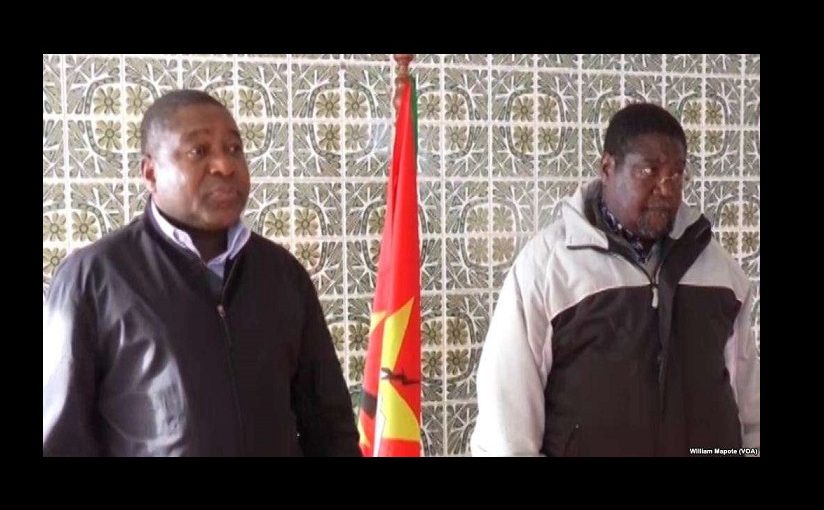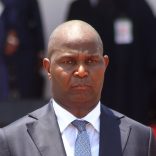Mozambique: Public consultation for “inclusive dialogue” will begin on 6 October
Nyusi and Momade agree on military issues – AIM report

Photo: Voa Portugues
Mozambican President Filipe Nyusi on Wednesday, in the central city of Beira, signed an agreement on the demilitarisation of the opposition party Renamo with Ossufo Momade, the coordinator of the Renamo Political Commission.
This agreement should end the deadlock between the parliamentary groups of Renamo and of the ruling Frelimo Party which made it impossible to hold an extraordinary sitting of the country’s parliament, the Assembly of the Republic, in late June. The sitting is necessary in order to amend the electoral legislation so that the municipal elections can be held on schedule, in October.
Frelimo refused to allow the sitting to go ahead before there was a firm commitment to demilitarisation from Renamo,
A statement from Nyusi’s office said that he and Momade had agreed in Beira on “the principles, processes, actions and timetable for the inclusion of soldiers from Renamo in the armed forces (FADM) and the police”.
The two men reaffirmed “the consensus previously obtained (between Nyusi and the late Renamo leader Afonso Dhlakama) on military matters regarding the disarming, demobilisation and reintegration of Renamo’s armed men”.
The Nyusi-Momade agreement envisages setting up no fewer than four new joint bodies between the government and Renamo. These will be: the Commission on Military Affairs; the Joint Technical Group on Disarmament, Demobilisation and Reintegration; the Joint Technical Group for Recruitment into the FADM and the Police; and the Joint Technical Monitoring and Verification Group.
Within ten days – so by 20 July – Renamo must submit a list of names of its officers to occupy the positions previously agreed in the negotiations between Nyusi and Dhlakama. Also within ten days, the government and Renamo must appoint their members of the Commission on Military Affairs and the three technical groups.
The statement adds that “the process for the demilitarisation and socio-economic reinsertion of Renamo’s armed members should begin simultaneously”.
Nyusi and Momade, it said, “reaffirmed their willingness to continue to interact in order to speed up implementation of the consensus on military matters”.
The statement claimed that the meeting between the two leaders “occurred in an environment of great cordiality, openness and frankness, and both sides reaffirmed their total commitment to achieving effective and definitive peace, as well as genuine reconciliation among Mozambicans”.
Nyusi and Momade urged “the entire Mozambican people and all national institutions to collaborate for the success in implementing” the agreement, and called on the international community for support.
Nyusi later told reporters he was confident that this time the inclusion of Renamo fighters into the defence and security forces would run smoothly because Renamo had promised to deliver a list of its armed members who should occupy military and police positions.
The inclusion of Renamo members in the military dates back to the 1992 peace agreement. This envisaged creating the FADM from a merger between the Renamo forces and the government army of the time, the FAM/FPLM. The FADM was to be 30,000 strong, 15,000 from the FAM/FPLM and 15,000 from Renamo.
But the peace accord also said that all the founding members of the FADM had to be volunteers – and there were nowhere near 30,000 volunteers. Attempts to pressgang members of both sides into the FADM failed, and unleashed a welter of mutinies in the assembly points where Renamo and government forces had gathered.
In the end, the government and Renamo had to accept the reality that most of their forces just wanted to go home. The FADM was thus formed out of whatever volunteers could be found – less than 12,000, about two thirds from the FAM/FPLM and one third from Renamo.
The FADM has grown subsequently on the basis of a 1997 law on military service, which reintroduced conscription and abolished all political criteria for recruitment.
Police recruitment was not covered by the peace agreement – but in the late 1990s the government, then led by President Joaquim Chissano, agreed to provide police training for Renamo members. Renamo was to provide the Interior Ministry with a list of the people it wished to be trained as policemen. But no such list was ever forthcoming, and Dhlakama eventually cancelled the whole arrangement.
Nyusi said that the demobilisation, disarming and reintegration of Renamo’s armed men involves complex procedures, but he assured the reporters in Beira that both sides are committed to moving ahead. This would give the deputies of the Assembly of the Republic assurances that the demilitarisation of Renamo would indeed take place.
Momade said that, from his talks with Nyusi, he was confident that Renamo armed men would indeed be included in the FADM and the police “through the lists that we shall hand over”.
But he made the disarming of what are known as the “Renamo residual forces” dependent on a successful conclusion of the recruitment or Renamo members into the army and police. He insisted that no weapons would be handed over until that was achieved.
“First, integration. Only then will demobilisation and the surrender of guns occur”, Momade said. “I don’t want to keep any guns. We would like to go into the elections with our officers already included in the police force”.
He claimed that, as a political party, Renamo is not armed. “Our delegates are not armed, our political commission is not armed. But there is a residual force which is indeed armed, and it is this force that we want to see recruited into the police”.
Renamo has never publicly provided any figures on its “residual force” – but it is unlikely to consist of more than a few hundred men. If these are men who have been with Renamo since the end of the war of destabilisation in 1992, they must now all be older than the normal recruitment age for either the military or the police.
The National Elections Commission (CNE) is pushing ahead with preparations for municipal elections to be held on 10 October. These are still possible – but only if parliament, in the very near future, approves changes in the electoral legislation bringing it into line with the constitutional amendments passed in May.













Leave a Reply
Be the First to Comment!
You must be logged in to post a comment.
You must be logged in to post a comment.